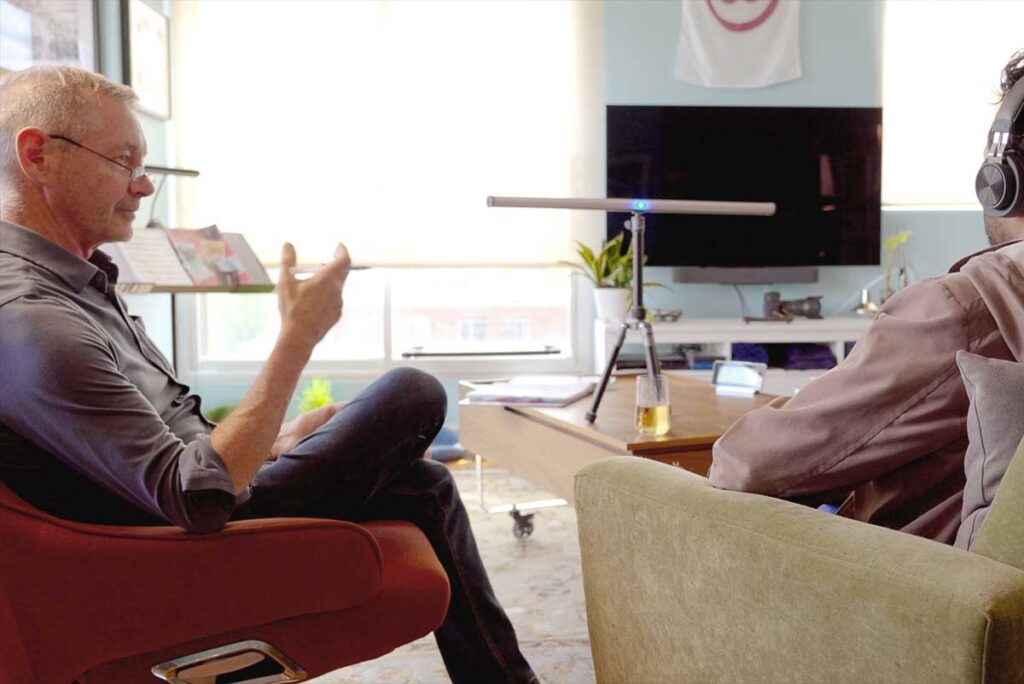Montreal Trauma Specialist Brian Powell, MSW
Heart-Centered Trauma Treatment, Grounded in Cutting-Edge Science
Brian Powell, MSW, is a Montreal based trauma specialist dedicated to helping you overcome pain and anxiety through the transformative power of EMDR.
Experience the profound healing and lasting relief that EMDR can provide.


Meet Brian, Your Trauma Specialist
Healing Trauma & Pain is My Expertise and Deepest Passion
I believe that deep caring and emotional safety are essential for healing trauma and pain. As your specialist, I am dedicated to fostering a compassionate, caring, and supportive environment where you can feel completely safe to heal the wounds that still affect you.
I specialize in working with individuals who have tried talk therapy but haven’t yet found the freedom they desire. Through EMDR – a cutting-edge treatment that I honed in my Master’s of Social Work at Smith College – I can help you process and release the emotional weight of past experiences, allowing you to move forward with renewed hope, energy, and resilience.
Trauma Treatment Services
Break Free from the Grip of Past Trauma and Reclaim Your Life


Why Choose EMDR and Other Advanced Trauma Techniques?
- Talk Therapy Isn’t Always Enough: Traditional talk therapy can not fully address the deep-seated effects of trauma.
- Directly Target Trauma: These techniques bypass the need to verbally recount traumatic events, making healing more accessible at a feeling and somatic level.
- Proven Effective: Research demonstrates the effectiveness of EMDR and other somatic therapies in reducing trauma symptoms.
- Personalized Approach: Choose the session length that best suits your needs and comfort level.
What People Say About Me
Together we can make your
painful symptoms go away in days, not years.
Schedule Your Free Consultation
Frequently Asked Questions
They may often feel/experience:
- Isolation
- Anger
- Unsafe
- Depressed
- Anxiety
- Sense of Loss
- Loneliness
- Flashbacks
- Sleep disturbances
- Intense fear
- Numbness
- Withdrawal
Supporting a survivor can come in the means of:
- Validating their feelings
- Give them a chance to tell their story
- Ask how they would like to be supported
- Giving them some resources that they can connect with
- Create safety by allowing them a healthy emotional space to talk
- Let them know it’s not their fault
- Staying calm
- Be a listening ear
- Empower and allow the survivor to make choices when they are ready
If you feel that someone you love is in imminent danger of harming themselves or others, call 911 for assistance.
- Set a good example.
Your child looks up to you and tries to be like you. It’s fine to tell your child to be respectful, truthful, helpful, and kind. But it won’t count unless you act that way, too.
- Give energy and attention to goodness.
What you feed, grows. Look for chances to reward positive behavior with your attention. Look for chances to give your attention when no negative behavior is happening.
- Don’t give energy and attention to badness.
What you feed, grows. Kids want any attention, good or bad. If you argue or yell at your child, he will learn to misbehave more to get your attention. Instead, simply give the child a short time out where no attention is available. When he is quiet again for a few minutes, then you can give him attention for behaving well.
- Keep your promises.
Your child counts on you to feel loved and secure. When you don’t come through on a promise, she may feel insecure, and believe that you don’t care about her. Promises are just as important whether it’s for a “goodie” or for something the child doesn’t even want, like a time out.
- Only make promises you can keep.
Don’t promise things you only wish could happen – it only hurts worse when it can’t. Also, avoid making big threats or punishments – these are promises, too. Later, you may realize that you were wrong, and take it back. Stick with promises that you can keep.
- Use consequences, not punishments.
A consequence is something that is naturally caused by a behavior. For example, if you are obnoxious or threatening, you can’t be around people for a little while. If you make a mess, you clean it up. If you don’t finish your homework, you can’t watch TV. If you leave my tool outside, I won’t want to lend it to you next time you ask. Children learn how to behave better from having natural consequences.
A punishment is something that is given by an angry adult for revenge. For example, if you do that one more time, you can’t go to the park tomorrow. Punishments – including spankings – are for children to suffer. Children also learn from punishments: they learn to be sneaky and hateful.
- Stay in control.
Everyone gets mad. The trick is to catch yourself when you’re just starting to get upset or frustrated. Then you can take care of the situation quickly, before it gets out of hand – maybe by giving a time out, finding some goodness to give attention to, or taking a time out for yourself. Parents make most of their mistakes when they are mad: they yell, they argue, they give attention to badness, and they give punishments – which might also turn out to be broken promises. If you can’t catch yourself before you lose control, get help and learn how. It’s worth it.
- Include your child.
Children naturally want to help out and be included. For example, even a very young child can “help” you wash dishes by stirring the dishwater with a spoon. If you take the time to include the child and to make chores fun, he will learn to be helpful and to feel good about himself.
- Make your child feel special.
Avoid comparing children to each other or trying to give each child exactly the same thing all the time. That just fosters insecurity and sibling rivalry. Children don’t need “equal” treatment; they need to feel special. Find ways of appreciating each child for her own qualities. You can show this with special privileges, small gifts, attention, or activities.
- Take care of yourself.
Obvious, but important anyway. Parents need nutritious food, enough sleep, exercise, friends, enjoyment, a little time off for themselves… Raising kids is a big challenge. If you’re in good shape yourself, you’ll have a better chance of being the kind of parent you want to be.
Parenting After Divorce
Divorce? First, I might try to talk you out of it. Counseling really can help. And if you don’t work out the problems in this relationship, they just might turn up in the next one. But if it’s a done deal, and if you have kids, there are two things you should know: 1) divorce can be hazardous to your child(ren); and 2) it doesn’t have to be. It’s important to understand what kids go through, so you can keep it from being worse than it has to be.
Taking Responsibility
Kids generally don’t like divorce. For one thing, the basics of life change in ways that can feel confusing and out of control. After all, the kids aren’t deciding to divorce, it just happens to them. One way kids handle this is by feeling guilty, as if the whole thing was their own fault. It might not make sense, but many kids actually believe that if they had behaved better, their parents would not have been so angry, wouldn’t have fought, etc. When a child feels at fault, at least she can feel that she has some control, can affect things. Blaming herself also allows the child to avoid blaming the parents, so she can keep on caring for both of them with minimal conflict.
In the long run, though, self-blame is a very destructive habit. It can lead to low self-esteem, depression, and chronic misbehavior. Parents can help their children to limit the self-blame by putting the responsibility where it actually belongs – with the parents. It’s important for both parents to tell the children, again and again, that the parents could not get along for grown-up reasons, nothing to do with the children. This message can be reinforced, oddly enough, by keeping your discipline consistent. How is this connected? Because then your child sees that he can’t push you around or control you – that the adults really are in charge of things. This also helps kids to feel more secure, and less likely to cling to irrational guilt.
Why should I lose a parent?
Kids also have a hard time adjusting to the logistics of parental separation. Home used to be where the heart was, and where the house was – all in one place. Now where’s home? It’s bad enough that you don’t know where your bedroom is. But what if Mom and Dad are mad at each other? Who do I love now? Will I hurt one parent’s feelings if I love the other one too?
Children can feel torn apart when their parents don’t help them with these questions. Unfortunately, some parents do things that make it much worse. It is all too typical for a parent to bad-mouth the ex in front of the children, forgetting that children love and identify with both parents, not just you. Even in the schoolyard, children will not tolerate any insult about their family. How much more it hurts when the insult about one parent comes from the other!
Some parents actually use their children as pawns or weapons in a battle with their ex. For example, one parent might retaliate against the other by cancelling a visit with the child, or by missing child support payments. Parents sometimes ask their children to spy for them, asking about the other parent’s new job or romance. And parents may pressure their children to choose one over the other, by saying bad things about the other parent, or by showing excessive need for the child’s favoritism.
These tactics might give the “winning” parent fleeting satisfaction, but the child is badly hurt. Whenever you “win” your child from the other parent, the child has lost. Your children need both parents, not just one. Just because you and your ex decided to divorce, you are still parents together. If you need to fight, keep your children out of it. They still need you to cooperate, so that they can continue to feel loved and secure. Children have enough loss and confusion without you making it worse.
Because divorce is such a stressful time for the adults involved, children’s needs are often left unnoticed. And the more angry and upset the adults, the higher the risk of children getting hurt in the fray. So it’s important to take care of yourself. Try to get enough exercise and good food – this is a cliche because it really is important. And make sure you have other adults to talk to, so you are not tempted to start confiding too much in your children. Other kids can be their friends – they need you to be their parent.
Since divorce is so common, we do know a lot about how to help children and keep them from getting needlessly hurt. Some families seek counseling to help them get through this difficult period. And in several parts of the country, courts actually require divorcing parents to attend workshops to learn how to protect their children. Probably within a few years, these mandated workshops will be much more widespread. Meanwhile, here are the most important guidelines to follow if you are a divorcing parent:
DO:
- Tell your children that they did not cause the divorce – that it was between the grown-ups.
- Keep the same rules and expectations as far as possible, to help your children feel secure.
- Take care of yourself. Stay healthy, talk out your problems with other adults.
- Actively support your child’s relationship with your ex.
DON’T:
- Don’t fight or argue with your ex in front of your kids – it’s scary and upsetting.
- Don’t blame or badmouth your ex in front of your kids – it makes them choose sides.
- Don’t use your child as a weapon, spy or messenger – take care of your own business.
- Don’t sabotage or viciously attack your ex – you will be hurting your child’s parent.
Of course, you will have to fit these rules to your own situation. For example, if your ex is dangerous to your child and they cannot have contact, you can still support their relationship, simply by acknowledging that your child might still feel affection for that parent. For another example, if you and your ex cannot have contact without explosive arguments, then only communicate in private, or through your lawyers, so that your children do not have to see the fireworks.
Of course, divorce doesn’t have to be a tragedy for children. Some children are relieved because their home setting is less stressful. When parents can help children to understand that the kids were not at fault, and that the parents are still the same to their children (if not to each other), then most children will adjust pretty well over time. Children can even learn to enjoy the benefits of the new arrangements – perhaps eventually including new family members.
Like it or not, a divorce only ends the romance and cohabitation. You are still parents together. And the better you are able to cooperate as parents, the less your children stand to lose.
- Sleep Disturbance.Your child may sleep fitfully, talk in sleep, have nightmares, scream, cry out, etc. When he awakens, he might need consoling and reassurance. Even though he may not recall what he was dreaming, he was probably remembering and reliving the accident. This is normal, and how our minds resolve traumatic events. Reassure your child that he is safe; tell him that he just had a bad dream about the accident, but it’s all over now. In the child’s waking hours, encourage him to talk about the accident – tell the story over and over. If he doesn’t remember, you can talk to him about it and tell him what happened. It’s important to talk about this to help normalize it. Many parents do not know this and are afraid to make their child think about it as it is unpleasant. However, then the child is left to deal with his memories all alone. Get him to share it with you even if it is hard for you to hear.
- Guilt.Some children think they have been bad and that is why the accident happened. Most children feel guilty about something they have done or thought about. Though unrelated, they think the accident is punishment. Tell your child that she is not a bad person, that she is not being punished. Reinforce this often.
- Acting Younger.Some children become frightened and afraid to be alone. Some children regress – act younger than their age. This is also normal. Give your child love and reassurance, but do not change drastically how you treat him. Understand that he feels ill and may be younger acting, but do not let him “get away” with behaviors you normally would not tolerate. Otherwise, your child will get the message that you believe something is wrong with him.
- Fear.Some children will continue to be afraid of things they associate with the accident, e.g., cars, the driver of the car. Gently, together, in small steps, increase their exposure to these things. Talk about each step along the way.
- Your Feelings.Sometimes parents will feel guilty and responsible. Remember, it is not your fault either. Parents can never watch their children at all times. Do not spend your energy feeling guilty and trying to make it up to your child. This is the time to be focusing on your child’s feelings, and helping her recover. If your feelings persist, and get in the way of helping your child, seek the support of another adult or a professional.
